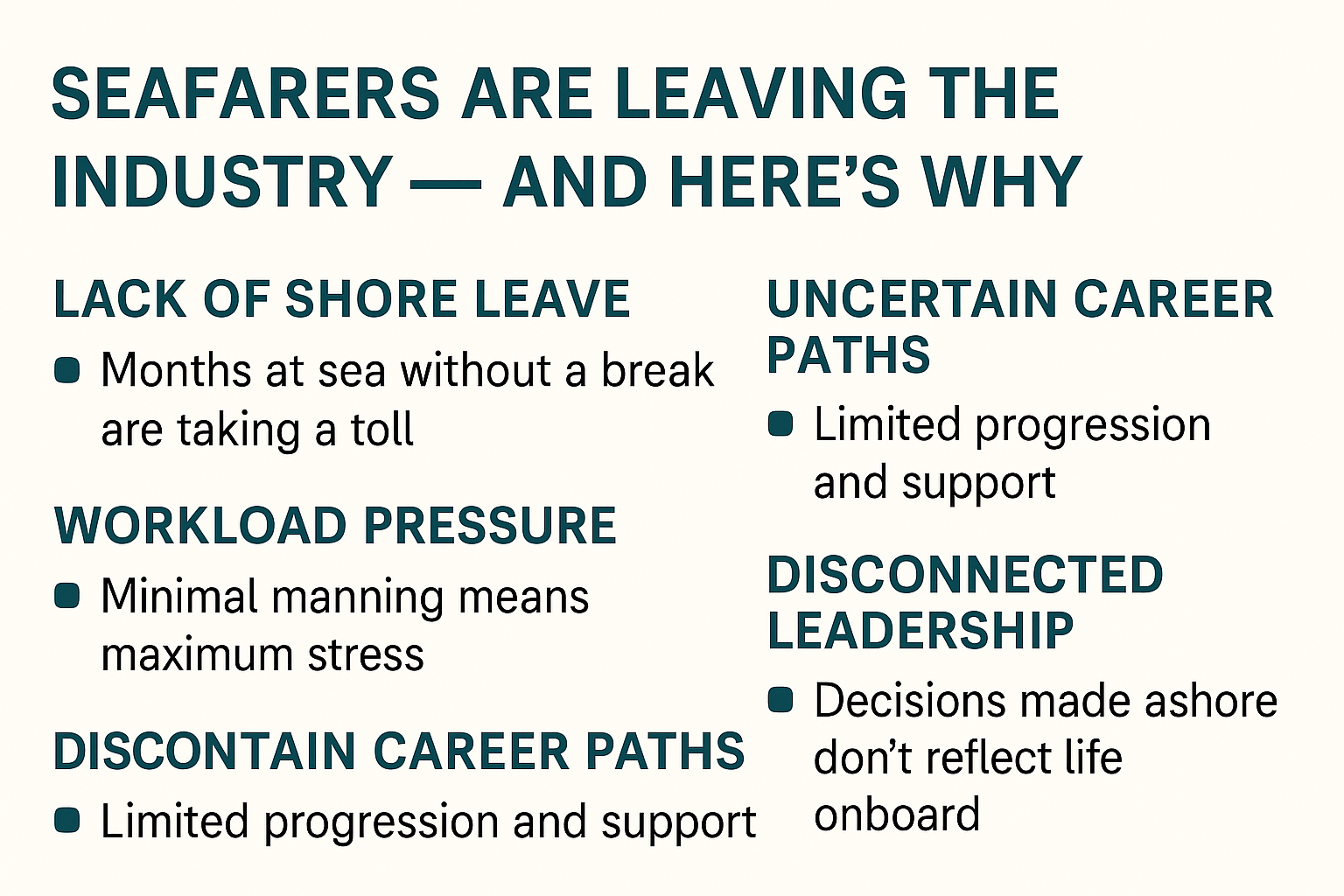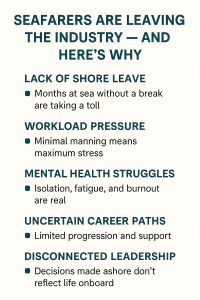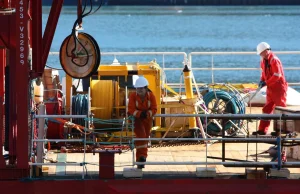The global maritime industry, the backbone of international trade, is silently approaching a tipping point. Behind the container ships, oil tankers, and bulk carriers that sustain our global economy, there’s a growing crisis that isn’t making enough headlines: seafarers are leaving the industry at an alarming rate.
After completing just a few contracts, many maritime professionals are choosing to never return to sea. Others are actively seeking onshore roles or entirely new careers. This isn’t just a staffing issue — it’s a looming sustainability challenge for global shipping.
But why is this happening? And more importantly, what can be done to stem the tide?
🌊 A Disappearing Workforce: The Hidden Cost of Modern Shipping
More than 90% of world trade is transported by sea. Yet the very people responsible for making that happen — the seafarers — are increasingly disillusioned. The maritime industry has long been known for its demanding nature, but in recent years, a perfect storm of challenges has made life at sea more difficult than ever.
This crisis is being fueled by five major factors:
🔹 1. Lack of Shore Leave – Trapped at Sea for Months
One of the most pressing issues facing seafarers today is the lack of shore leave.
Due to heightened security regulations, immigration hurdles, pandemic-related restrictions, and increased port turnaround pressures, many seafarers spend months at sea without stepping foot on land.
Gone are the days when sailors could explore foreign ports or get a much-needed break. Today’s shore leave is often denied or reduced to hours of dockside operations.
“We don’t get off the ship anymore. We just load, discharge, and sail again.” – 2nd Officer, bulk carrier
Why This Matters
-
Mental and emotional fatigue builds when there’s no break in routine.
-
Physical health declines without access to varied environments and fresh air.
-
Morale drops, contributing to burnout and resignation.
🔹 2. Workload Pressure – Minimal Manning, Maximum Stress
Shipping companies have adopted minimum manning policies to reduce costs — but at what cost?
Today’s vessels operate with the smallest legally permissible crew sizes. While technology has replaced some manual tasks, the complexity of modern operations means each seafarer now juggles multiple roles.
Deck officers are overburdened with paperwork and compliance tasks. Engineers are stretched thin maintaining intricate machinery without adequate support.
“We are running 24/7 operations with half the team we actually need.” – Chief Engineer, container vessel
Impact on Seafarers:
-
Excessive overtime and fatigue
-
Increased risk of accidents and errors
-
Reduced quality of rest and recovery
-
No time for personal development or mentorship
🔹 3. Mental Health Struggles – Isolation and Burnout at Sea
Isolation is a silent killer in the maritime world.
Seafarers spend months away from family and friends, often with limited or no internet connectivity. This disconnect from normal life contributes to:
-
Loneliness
-
Depression
-
Anxiety
-
Suicidal ideation
COVID-19 made this crisis visible. Crew changes were delayed. Contracts were extended indefinitely. Some mariners were stuck aboard for over a year. The psychological toll was immense — and for many, it was the last straw.
“I missed my child’s birth. I missed my mother’s funeral. I can’t go through that again.” – AB, oil tanker
Mental Health Facts:
-
According to ITF, over 25% of seafarers report depression symptoms.
-
Suicide is one of the leading causes of death at sea.
-
Only a fraction of seafarers receive mental health support or counseling.
🔹 4. Uncertain Career Paths – No Clarity, No Progression
The maritime industry suffers from a lack of structured career development.
Unlike land-based professions, many seafarers find themselves trapped in repetitive contracts with no clear progression. Promotions are often slow, inconsistent, and dependent on company needs rather than merit.
Training is expensive, and not always reimbursed. Certifications and compliance requirements are constantly changing. Those who want to advance face bureaucratic hurdles and unclear expectations.
“You can’t plan your career when your next contract depends on company politics.” – 3rd Officer, LNG carrier
Barriers to Advancement:
-
Lack of transparency in promotion processes
-
High cost of obtaining licenses and certifications
-
Absence of mentorship or leadership training
-
Poor work-life balance discouraging long-term commitment
🔹 5. Disconnected Leadership – Ashore vs. Afloat Divide
There’s a growing disconnect between those who run shipping companies from shore and those who work onboard vessels.
Seafarers often report feeling like they are treated as expendable, with decisions being made without understanding the challenges of shipboard life.
“They talk about safety, but they pressure us to cut corners to meet deadlines.” – Bosun, car carrier
This top-down, numbers-first approach has created resentment and a toxic culture of mistrust. True leadership in the maritime industry must be grounded in empathy and firsthand experience — something that’s becoming increasingly rare.
💥 Why This Is a Global Shipping Crisis — Not Just an HR Issue
The departure of experienced seafarers isn’t just a workforce problem. It’s a direct threat to the sustainability, safety, and reliability of global trade.
Consequences of Mass Attrition:
-
Increased accident risks due to inexperienced crews
-
Higher insurance premiums and legal liabilities
-
Operational delays and reduced fleet availability
-
Rising recruitment and training costs
-
Talent shortages threatening long-term viability
Many shipping companies are already feeling the pinch. The cost of hiring new seafarers has surged, while the pool of qualified, experienced officers continues to shrink.
🚢 What Could Bring Seafarers Back?
The solution lies in a holistic, human-centered reform of the industry. Here’s what maritime stakeholders can do:
✅ 1. Restore Shore Leave Rights
Governments and port authorities must work together to:
-
Remove bureaucratic barriers to shore leave
-
Improve port access for vaccinated and healthy crews
-
Offer wellness centers and seafarer hubs in major ports
✅ 2. Increase Manning Levels
Minimum manning regulations need to be re-evaluated to ensure safe, humane workloads. Companies should:
-
Invest in larger crew complements
-
Rotate duties to reduce fatigue
-
Promote team-building and crew cohesion
✅ 3. Prioritize Mental Health
Mental health is just as vital as physical health. Practical steps include:
-
Confidential counseling services (onboard and online)
-
Wellbeing check-ins as part of safety procedures
-
Training officers to be mental health first responders
✅ 4. Build Transparent Career Pathways
To retain and inspire talent, the industry must:
-
Publish clear promotion criteria
-
Offer scholarships and training sponsorships
-
Provide onboard mentorship and skills development
✅ 5. Close the Leadership Gap
Company executives and shoreside managers should:
-
Spend time at sea to understand modern shipboard life
-
Create feedback loops with crew input in policy decisions
-
Emphasize people over profits in operational planning
🌍 The Bigger Picture: A Sustainable Maritime Future
The maritime industry is undergoing rapid digitalization and decarbonization. But those efforts will mean nothing if there are no motivated crews left to operate ships.
We must recognize that seafarers are not just labor—they are skilled professionals who deserve respect, support, and meaningful careers. Solving this retention crisis is not only a moral imperative — it’s a commercial and operational necessity.
💬 Final Thoughts: Are You Seeing This Too?
If you’re a shipowner, crewing agency, maritime educator, or port authority, now is the time to act. Talk to your seafarers. Reevaluate your policies. Push for systemic change.
If you’re a seafarer reading this — your voice matters. Share your experiences. Advocate for your rights. Let the industry hear the truth.
🧭 Conclusion: The Sea is Calling, But Who’s Listening?
The global shipping industry cannot afford to continue treating its workforce as a disposable asset. If we want a resilient, safe, and sustainable maritime sector in the decades ahead, we must start by valuing the people who make it possible.
Because once the seafarers are gone, there is no global trade.




